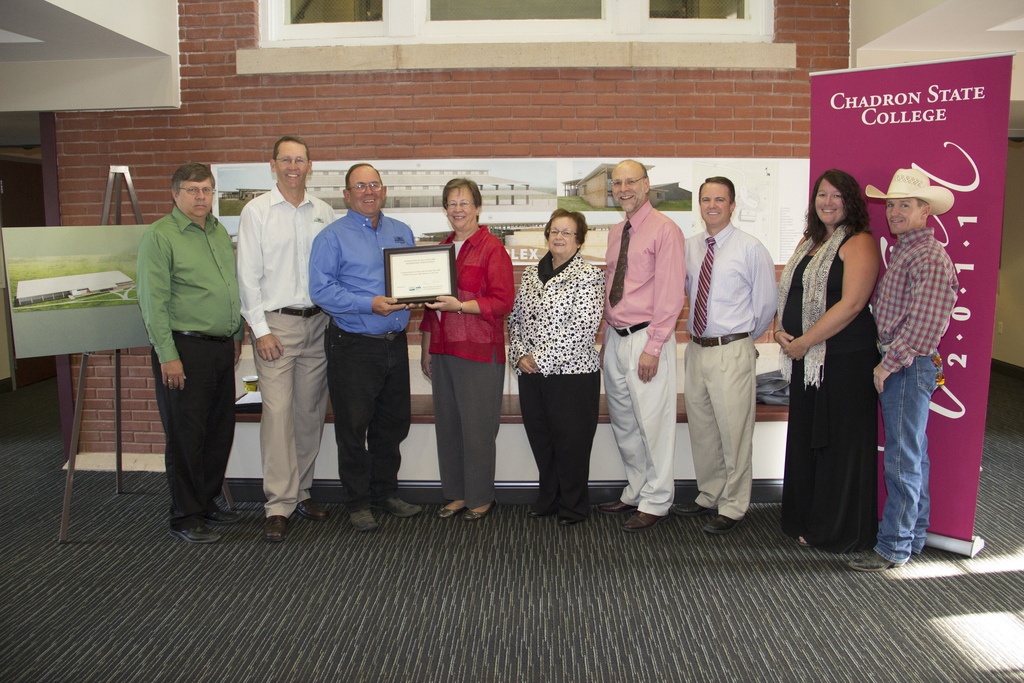PREMA's loan from USDA Rural Development to boost Rangeland Center

PREMA is the recipient of a $1 million Rural Economic Development Loan, referred to as REDL, which will be leveraged with nearly $1.9 million in public and private funds to assist in constructing the first phase of Chadron State College’s Rangeland Agriculture Center and Pavilion.
USDA Rural Development Director Maxine Moul and other staff members joined representatives from PREMA and CSC in Chadron today (Monday, Aug. 6) to formally recognize the loan.
The new center and pavilion will help further the goals of rural development by educating the next generation in agriculture, veterinary sciences and natural resources. In addition to the immediate positive effects on the economy, such as construction activity, college officials also expect that the new center and pavilion will be an asset for student recruitment, which could lead to the need for additional faculty and staff.
“The $1 million loan awarded to the Panhandle Rural Electric Membership Association is the largest ever funded in Nebraska through REDL and will help provide for economic development in this rural area,” said Moul. “I congratulate PREMA for its foresight in seeking the funding and look forward to the completion of phase one of the center and pavilion.”
Ryan Reiber, PREMA general manager, also related the importance of supporting rural development.
“PREMA is committed to western Nebraska and especially economic development in the rural areas. The PREMA Board of Directors, by arranging for this USDA REDL has shown its support of rural economic development which helps improve the quality of life in western Nebraska,” Reiber said.
PREMA has been certified as an eligible rural utility under the USDA Rural Utilities Service REDL program. The loan will be repaid to PREMA with CSC funds that include gifts and pledges to the Chadron State Foundation’s Vision 2011 fundraising campaign.
“We at Chadron State are extremely thankful for the efforts of USDA Rural Development and PREMA to help make this funding a reality,” said Dr. Randy Rhine, CSC interim president. “This loan will help put us in a position to begin moving dirt for a project that is generating excitement not only on campus, but throughout the region. Agriculture is the backbone of our economy, and we are eager to enhance our already exceptional offerings with this new facility.”
Fran Grimes, chairman of the Chadron State Foundation board of directors, agreed.
“It was great to receive notification that CSC is receiving this funding and I am grateful for those who made it possible,” Grimes said. “The Rangeland Agriculture Center and Pavilion has been a key project for the foundation and we are excited to partner with the college in securing funds to move this project forward.”
The Rangeland Agriculture Center and Pavilion will be home to CSC’s rangeland management and agriculture programs. The facility will permit CSC to expand its academic courses in range management, domestic livestock, equine science, wildlife management, soil and plant sciences, and production processes and technique.
CSC is home to the second largest rangeland program on the Great Plains, second only to Texas A&M University. Graduates of the CSC rangeland and agriculture program frequently return to continue the tradition of family farming in ranching in the Great Plains. Their academic training includes learning new technologies, strategies and scientific methodologies designed to make rangeland management and agri-business more efficient and productive.
The center and pavilion is to be a 38,872-square-foot complex contained in two separate but adjacent buildings. For efficiency and to facilitate phased construction as well as LEED certification, the Rangeland Center is designed as two facilities and will be built in two phases. The first phase will house an arena for the rodeo team to practice and perform, areas for instruction and demonstrations with live animals, and space for activities such as workshops, seminars and exhibitions that will support the student learning and surrounding communities.
Dale Grant, CSC vice president for administration and finance, said Monday that workers may begin moving dirt for the project in as soon as 30 days.
Category: Campus News
